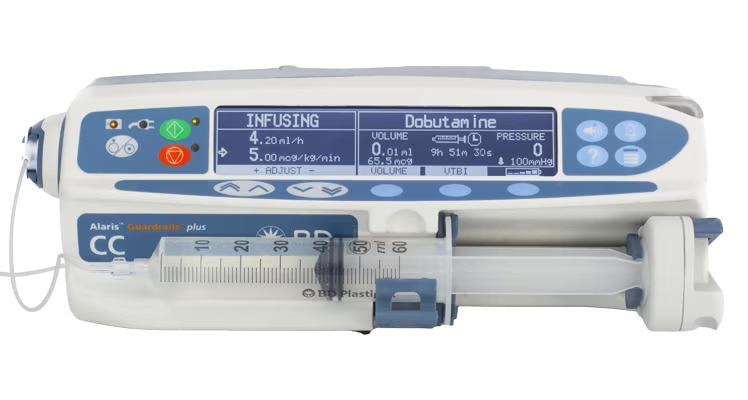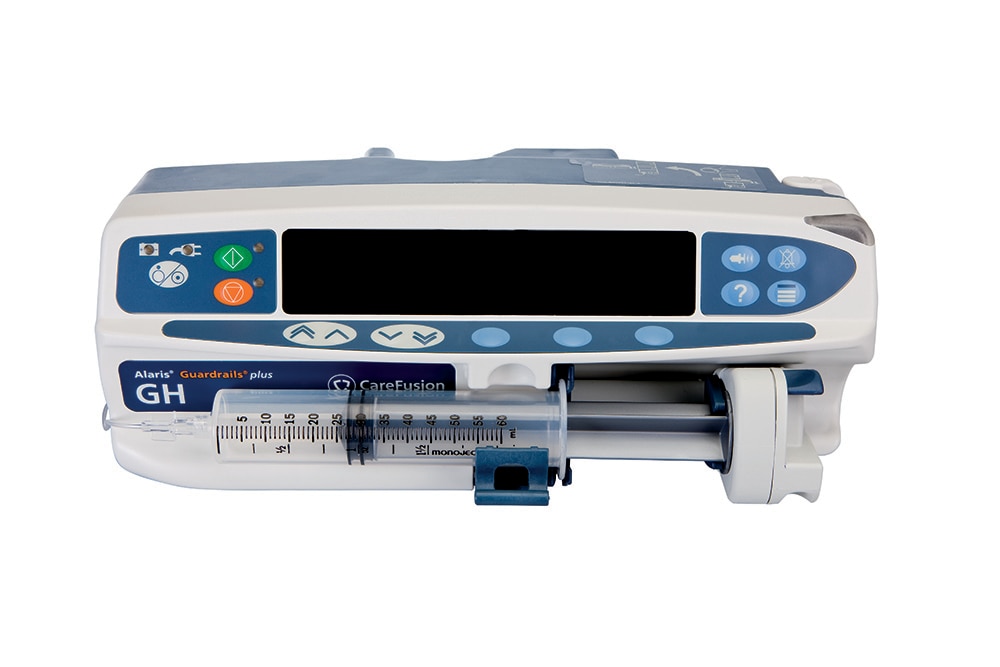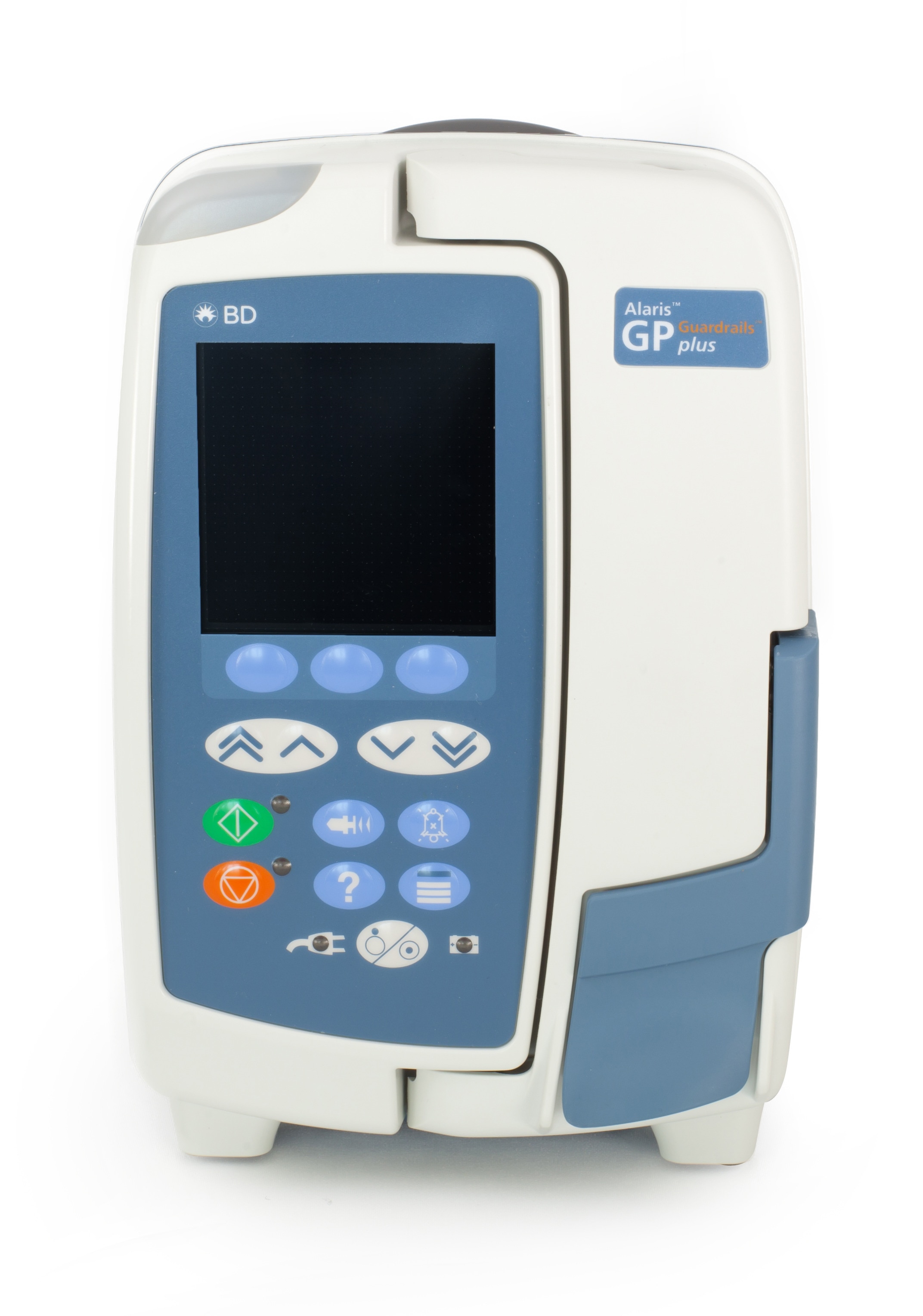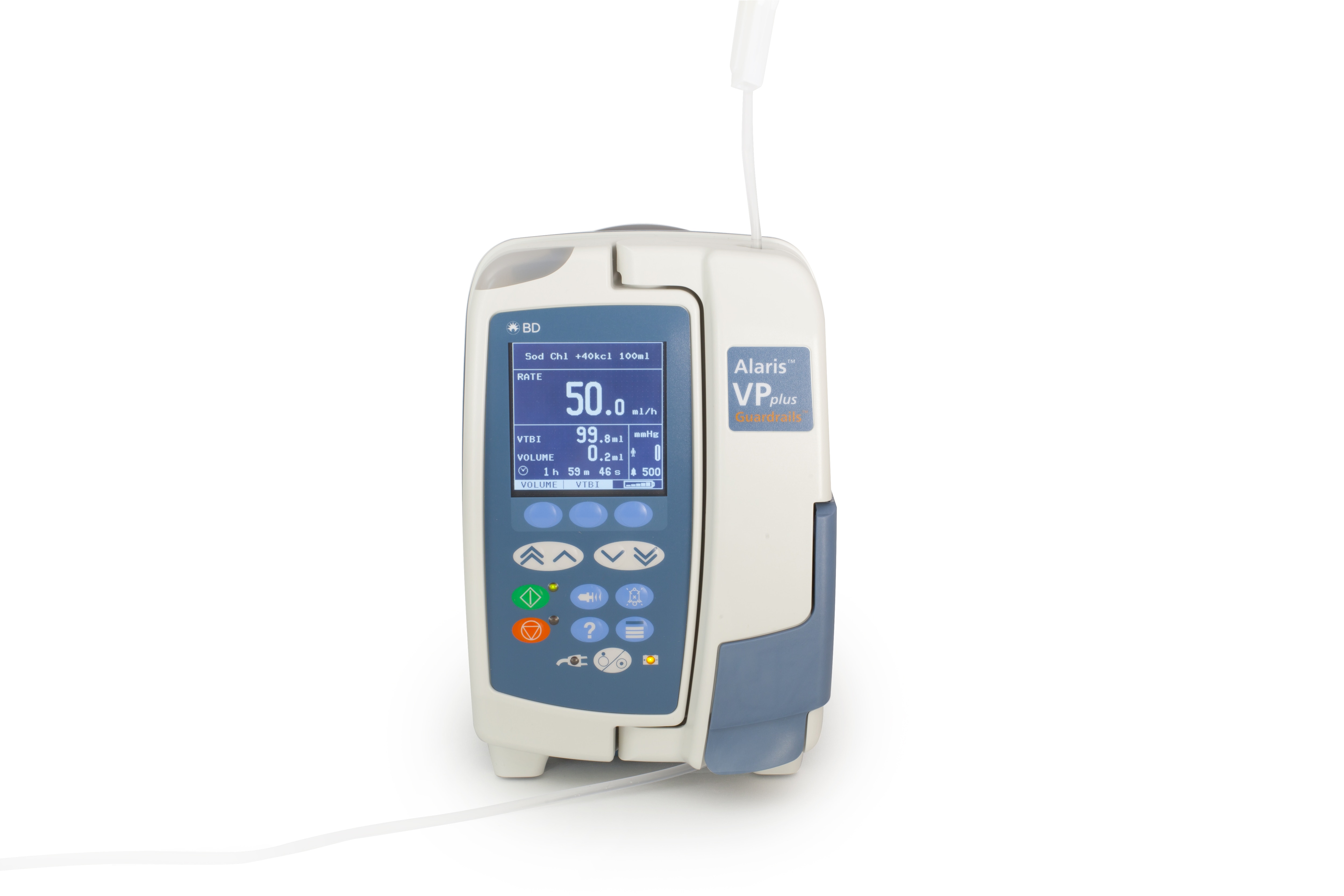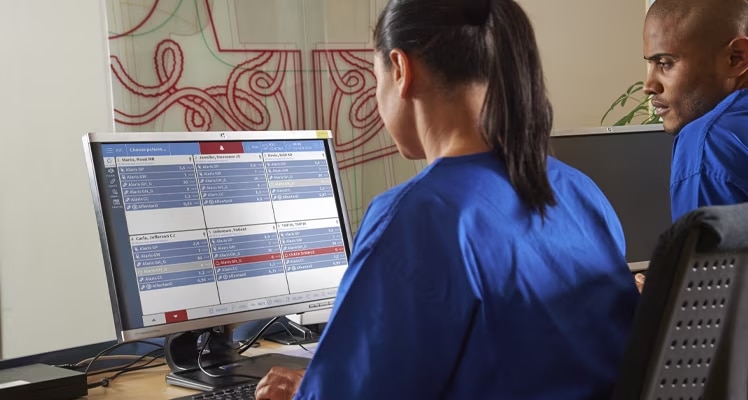

- Overview
- EIFU & Resources
BD Alaris™ Guardrails™ Safety Software for the BD Alaris™ Plus Platform
Medication errors are a serious healthcare issue: 237 million medication errors occur in the UK each year resulting in costs of £1.6B p.a.1 28% of these errors are potentially harmful to patients.1 Medication errors can occur at any stage of the medication delivery process, from prescription to administration2 and those occurring at the administration stage are the hardest to intercept2. Of particular concern is that intravenous (IV) infusions are responsible for more than 50% of all medication related adverse events involving hospitalised patients3. They have been identified as frequent contributors to medication errors4 and resulting patient injuries4.
BD provides advanced IV medication safety solutions, that help Healthcare Professionals standardise IV infusion protocols, protect patients and the clinicians, evaluate IV administration practice, and improve the quality of infusion therapy.
These advanced infusion solutions consist of the BD Alaris™ Plus Guardrails™ smart pumps, safety software suite, and supporting services that have demonstrated proven results in helping to improve medication error reduction5 and costs associated with such errors6, while supporting continuous quality improvement5.
Standardisation is the first step to infusion medication safety. Smart pumps with soft and hard limits on standardised concentrations and flow rates help reduce dose errors.
BD Alaris™ Editor allows you to:
- Develop a drug library of IV medication following best practices. Drug set up parameters include:
- Drug concentrations; Minimum and maximum concentration limits; Weight limits; Pressure Limits
- Dosing units; Minimum and maximum dose limits
- Hard and soft alert settings; Bolus alert settings
- Standardise and maintain hospital guidelines for IV drug infusion
- Set default and maximum dose rate limits for up to 3,000 unique drug/concentration setups, per hospital data set
- Configure general pump settings
Adverse Drug Events (ADEs) are a healthcare priority with the objective of reinforcing the quality of care and reducing undesirable event linked to healthcare products.
ADEs are associated with increased morbidity and mortality7,8 prolonged hospitalisations9, and higher costs of care10.
BD Alaris™ Plus Guardrails™ Pumps use BD Alaris™ Guardrails™ Safety Software, which provides safety limits for each drug by care area, promoting safe delivery of IV medication.
BD Alaris™ Guardrails™ systems are demonstrated to be profitable in a pediatric intensive care unit because of their ability to intercept potentially serious medication errors and to reduce costs associated with such errors11.
Nurses lose valuable time looking for information or dealing with predictable alarms. Increasingly, patients are placed in individual rooms to prevent infections. This makes managing infusion pumps even more difficult.
Alaris™ Infusion Central is software that displays infusion status data in near real time allowing staff to view the ward's infusions on a computer display in order to help improve infusion preparation and management.
Feedback on serious Adverse Drug Events (ADEs) associated with healthcare and/or near-miss incidents are central to every hospital's contractual commitments
With BD Alaris™ Guardrails™ CQI Event Reporter hospitals can accurately document ADEs and monitor trends. This information helps identify education needs and required clinical practice changes for improved patient protection. Acting on CQI data facilitates risk management, provides opportunities for dataset and medication guideline enhancement and increases workflow efficiency.
BD Alaris™ Guardrails™ CQI Event Reporter helps to:
- Provide a complete solution for Continuous Quality Improvement (CQI)
- Assist hospitals’ quality assurance systems because of its complete audit for compliance, including detailed reports of deviations from best practice, with a wide range of tailor-made analyses (Figure 1)
- Provide evidence of actual drug usage across all care areas
- Assist identification of training and education needs
Figure 1: Number of Hard Limit alerts generated in ICU*.
* Fictitious data based on representative reports from various practices equipped with BD Alaris™ Guardrails™ Safety Software
In this example, the pump did not allow the user to start the infusion where the morphine dose entered into the setting of the pump was 100 times more than the hard limit that was programmed.
Hospitals need a quality management system to ensure the quality and safety of drug administration to their patient. Data analyses lead to corrective actions and their efficacy can be verified. Data set-up/downloads are done manually and take significant time; automated systems are required to optimise workflow management.
With BD Alaris™ Guardrails™ Safety Services, you receive a comprehensive Infusion Medication Safety Service including full project management and clinical consulting for BD Alaris™ Guardrails™ Safety Software:
- A customised project plan is provided to meet the hospital’s needs for Pump Implementations, Dataset Development, CQI Analysis, and Dataset Review
- A highly qualified Medication Safety Specialist is dedicated to each customer to assist with all project milestones
BD's Medication Safety Team has extensive implementation and support experience in the IV medical technology industry, helping you to gain the full benefit of your IV device investment.
With BD Alaris™ Communication Engine software you can:
- Allow near real-time data transfer of data sets to BD Alaris™ Guardrails™ pumps over the hospital network while pumps are infusing
- Automatically & continuously collect BD Alaris™ Guardrails™ events from BD Alaris™ Guardrails™ pumps and populate the BD Alaris™ Guardrails™ CQI Event Reporter database
- Locate pumps connected to the BD Alaris™ Gateway Workstation (AGWs) linked to the hospital's network.
- View the infusion status of BD Alaris™ Guardrails™ pumps connected to AGWs.
BD supports the healthcare industry with market-leading products and services that aim to improve care while lowering costs.
Please note, not all products, services or features of products and services may be available in your local area. Please check with your local BD representative.
- Elliott RA, Camacho E, Campbell F, Jankovic D, Martyn St James M, Kaltenthaler E, Wong R, Sculpher, MJ, Faria R. Prevalence and economic burden of medication errors in the NHS England. Policy Research Unit in Economic Evaluation of Health & Care Interventions (EEPRU), The University of Manchester, University of Sheffield and University of York. Report.2018 Feb; 1-174.
- Bates DW, Cullen DJ, Laird N, Petersen LA, Small SD, Servi D, Laffel G, Sweitzer BJ, Shea BF, Hallisey R, et al. Incidence of adverse drug events and potential adverse drug events. Implications for prevention. ADE Prevention Study Group. JAMA. 1995 Jul 5;274(1):29-34. PMID: 7791255.
- Ross LM, Wallace J, Paton JY. Medication errors in a paediatric teaching hospital in the UK: five years operational experience. Arch Dis Child 2000 Dec;83(6):492-7.
- Husch M, Sullivan C, Rooney D, Barnard C, Fotis M, Clarke J, et al. Insights from the sharp end of intravenous medication errors: implications for infusion pump technology. Qual Saf Health Care 2005 Apr;14(2):80-6.
- Manrique-Rodríguez S, Sánchez-Galindo AC, Fernández-Llamazares CM, Calvo-Calvo MM, Carrillo-Álvarez Á, Sanjurjo-Sáez M. Safe intravenous administration in pediatrics: A 5-year Pediatric Intensive Care Unit experience with smart pumps. Med Intensiva. 2016 Oct;40(7):411-21. English, Spanish. doi: 10.1016/j.medin.2016.01.011. Epub 2016 Mar 26. PMID: 27026063.
- Manrique-Rodríguez S, Sánchez-Galindo AC, López-Herce J, Calleja-Hernández MÁ, Martínez-Martínez F, Iglesias-Peinado I, Carrillo-Álvarez A, Sanjurjo-Sáez M, Fernández-Llamazares CM. Implementing smart pump technology in a pediatric intensive care unit: a cost-effective approach. Int J Med Inform. 2014 Feb;83(2):99-105.
- Classen DC, Pestotnik SL, Evans RS, Lloyd JF, Burke JP. (1997).Adverse drug events in hospitalized patients. Excess length of stay, extra costs, and attributable mortality. JAMA. 277(4):301
- Cottell 2020 - Medication-related incidents at 19 hospitals: A retrospective register study using incident reports, DOI: 10.1002/nop2.534
- Fanikos J, Cina JL, Baroletti S, Fiumara K, Matta L, Goldhaber SZ. (2007). Adverse drug events in hospitalized cardiac patients. Am J Cardiol. 100(9):146
- Council of Europe - Creation of a better medication safety culture in Europe: Building up safe medication practices; Expert Group on Safe Medication Practices (P-SP-PH/SAFE) (2006)
- S. Manrique-Rodríguez, A. C. Sánchez-Galindo, J. López-Herce, M.- Á. Calleja-Hernández, F. Martínez-Martínez, I. Iglesias-Peinado, Á. Carril lo-Álva rez, M. Sanjurjo-Sáez, C. M. Fernández-Llamazaresa. (2014 Feb). Implementing smart pump technology in a pediatric intensive care unit: a cost-effective approach. International Journal of Medical Informatics. 2014 Feb;83(2):99-105.
BD-44667
